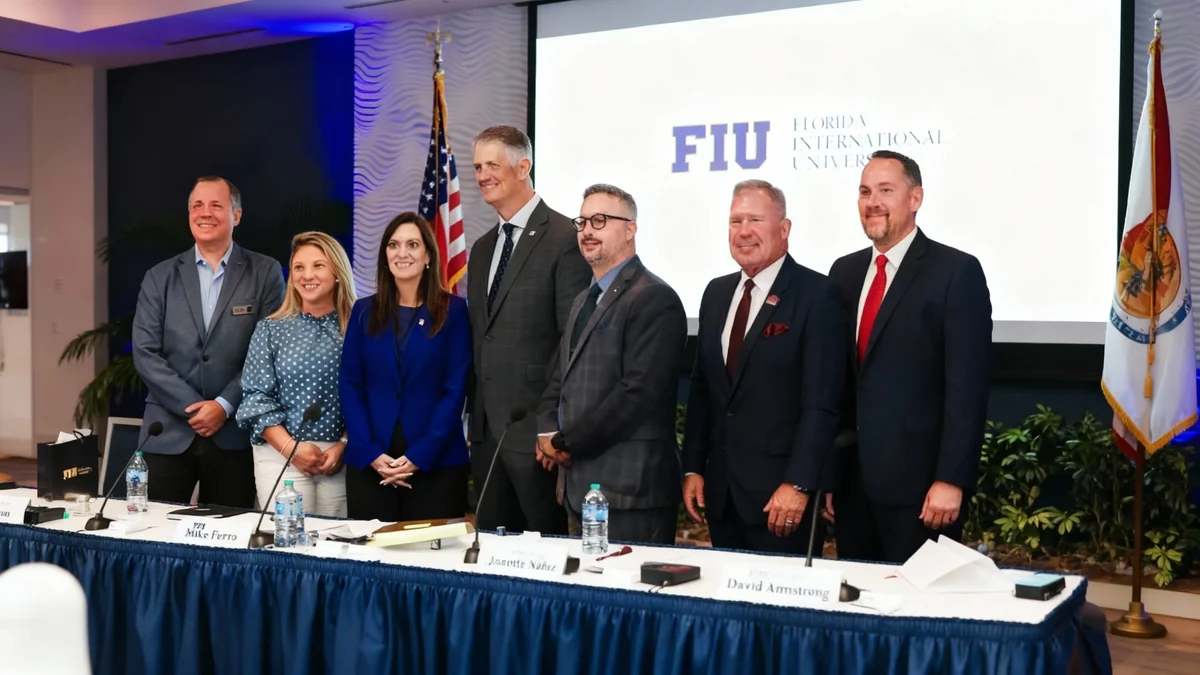As Florida solidifies its role as a global hub for space exploration, Florida International University (FIU) is carving out a critical niche, moving beyond engineering to address the complex legal and security challenges of the final frontier. The university is leveraging its expertise in public policy to guide the rules of engagement in an increasingly crowded and competitive outer space.
With the state's aerospace sector contributing nearly $6 billion annually to the economy, leaders are recognizing that the next phase of space development is not just about building better rockets, but about establishing the frameworks that will govern them. FIU's Jack D. Gordon Institute for Public Policy is now at the forefront of this emerging and vital conversation.
Key Takeaways
- Florida International University is expanding its focus from space technology to space governance and security.
- The university's Jack D. Gordon Institute for Public Policy has hired a space policy specialist to lead research.
- FIU President Jeanette M. Nuñez also serves as chair of Space Florida, linking the university directly to state-level aerospace strategy.
- The initiative aims to address policy gaps, international collaboration, and national security concerns related to space.
Florida's New Space Race
Florida's identity has long been intertwined with space exploration, but the modern aerospace landscape is vastly different from the era of the Apollo missions. Today, the sector is a powerful economic engine, supporting over 150,000 jobs and attracting private industry giants like SpaceX, Blue Origin, and Boeing.
This commercial boom has shifted the conversation. While technological innovation remains paramount, urgent questions about governance, international law, and security have surfaced. Who sets the rules for commercial activity in orbit? How are national security interests protected as more countries and companies gain access to space?
A Strategic Connection
FIU's leadership is uniquely positioned to influence this domain. University President Jeanette M. Nuñez also chairs Space Florida, the state's aerospace finance and development authority. This dual role creates a direct channel between academic research and the state's strategic planning for its multi-billion dollar space industry.
It is within this context that FIU is stepping forward, aiming to provide the intellectual framework for this new era. The university is focusing on creating policy that can keep pace with rapid technological advancement.
The Policy Frontier at JGI
Leading FIU's charge into space governance is the Jack D. Gordon Institute for Public Policy (JGI). Established in 1985, the institute has a long history of research in national security and cybersecurity. Now, it is applying that expertise to the cosmos.
"Space is not just a scientific frontier. It’s a strategic domain where global economic, security and geopolitical interests are converging, and our policies must evolve accordingly." - Brian Fonseca, Director, Jack D. Gordon Institute for Public Policy
To spearhead this effort, JGI has brought on Laura Delgado López as a senior fellow. With more than 15 years of experience, including a role as a policy advisor to NASA’s Science Mission Directorate, Delgado López brings a wealth of knowledge to the university.
Her work focuses on space governance and security, with a particular emphasis on Latin America. The region's growing "NewSpace" startup ecosystem makes it an increasingly important player in the global space economy.
Mapping the Cosmos
One of Delgado López's key projects is the development of a "space policy dashboard." This tool will map the complex network of public and private entities operating in space to help identify policy gaps and foster stronger international cooperation.
This research aligns with the interests of U.S. Southern Command (SOUTHCOM), headquartered near FIU in Doral. SOUTHCOM views space through the lens of strategic competition and regional security, making JGI's work directly relevant to national security priorities.
Training the Next Generation
A core part of FIU's mission is preparing students to become leaders in this emerging field. The university is creating opportunities for students to engage directly with complex, real-world policy challenges.
Alexandra Bishop, a senior and junior research analyst at JGI, is one such student. Under the mentorship of Delgado López, she is studying China's access to space facilities in Argentina and its implications for U.S. national security.
"My work at JGI has taught me how to analyze problems impartially and write accurate, thoughtful recommendations that are presented to policymakers." - Alexandra Bishop, Junior Research Analyst, JGI
This hands-on experience provides students with a unique understanding of the intersection between technology, global strategy, and security. It is this type of training that will cultivate a new generation of experts equipped to navigate the complexities of space governance.
A Multidisciplinary Approach to Space
While JGI tackles policy, FIU's engineering and science departments continue to push the boundaries of space technology. This multidisciplinary approach ensures that policy development is informed by a deep understanding of the underlying science.
Currently, more than 50 FIU students are involved in projects funded by NASA, working on technologies destined for orbit and beyond.
Key Research Hubs at FIU:
- NASA Center for Research and Education in 2D Optoelectronics (CRE2DO): Researchers here are developing new materials for space-resilient communications and satellite systems.
- Plasma Forming Laboratory: This lab focuses on creating advanced materials and coatings designed to withstand the harsh conditions of deep-space missions.
- Transforming Antennas Center: Engineers are pioneering foldable and reconfigurable antennas that can operate at higher frequencies, enabling faster and more reliable space communications.
By uniting engineers, scientists, and policymakers, FIU is creating a comprehensive ecosystem for space innovation. This collaborative effort aims to solve the most pressing challenges of the new space age, from building resilient hardware to shaping the policies that ensure its responsible use.
As Delgado López notes, "Space is still a young field, but with a rich history. That makes it an exciting industry for students to build their careers." With its strategic focus on both technology and policy, FIU is ensuring its students are ready to lead the way.





